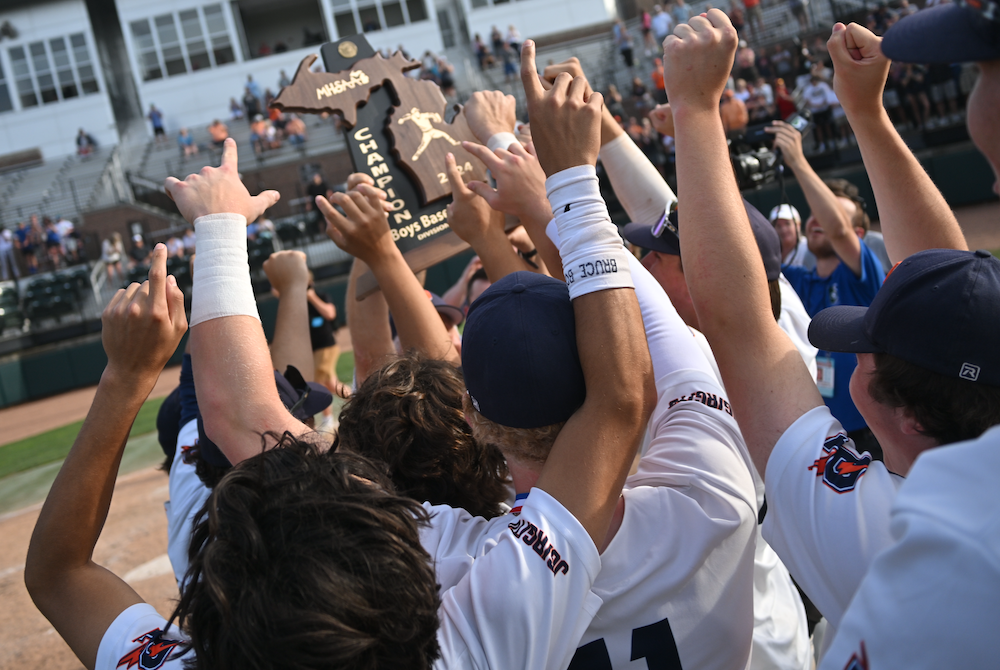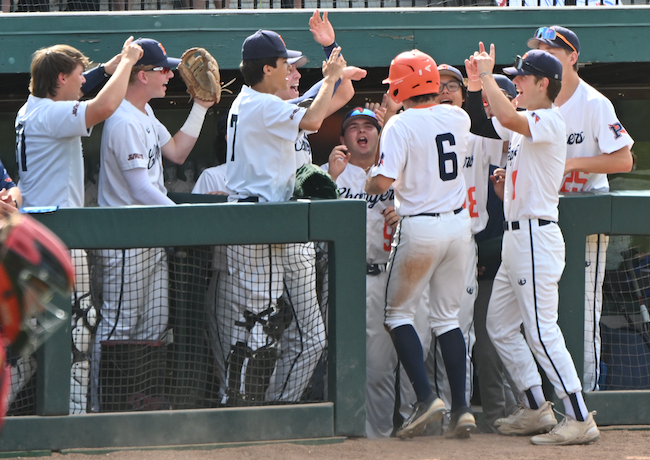
Keep on Coaching
February 1, 2013
By Geoff Kimmerly
Second Half editor
A few weeks ago, I finally got my first chance this season to watch a friend coach his basketball team. After guiding some others at the lower levels, this is his first time running the varsity – something he wasn't sure he wanted to do with a 1-year-old just learning to walk, but a challenge he ended up taking on to the benefit of all those involved.
Simply put, he’s good. I've seen a lot of teams and a lot of coaches over the past 15 years, and although I wouldn't know much of what to do if I were walking the sideline, I felt pretty qualified in telling him I was impressed – even if he didn't buy that I was offering an unbiased opinion. The best news is he’s gone from not sure about this a few months ago to talking about next season.
We know, at least anecdotally, that coaching continues to get more challenging. The time commitment has grown substantially to make running a program a year-round endeavor in a lot of sports at a lot of schools.
That commitment – especially for coaches with children of their own – was a main reason referred to in a New Haven Post-Chronicle story Saturday that noted 23 football coaching openings in Connecticut at one point this offseason. That state has 146 football teams – meaning roughly 15 percent will have new leaders this fall.
And that got me thinking about my friend, about how glad I am he’s given this a shot, and how I've seen so many others either not do so, or not stick around long despite having some pretty nice success.
A study published last winter in Interscholastic Athletic Administration magazine – a product of the National Interscholastic Athletic Administrators Association – noted some predictable results of a study that sought to determine the biggest challenges faced by first-year high school coaches.
The toughest according to the study was balancing the demands of coaching and teaching, experienced by nearly half the respondents – 98 percent of which coached high school teams and 81 percent of which are teachers.
The next six reasons all were noted by at least 30 percent of those in the study – personal fatigue, securing community support, securing and caring for facilities and equipment, parental contact, keeping non-starting players motivated, dealing with schedule interruptions and motivating athletes to achieve consistent, peak performance.
Nothing there is earth-shaking, and most if not all of these challenges are faced by high school coaches regardless of how long they've been in the field. But I got a little more perspective from some of the 32 items that ranked as least challenging to the first-year leaders – keeping in compliance with state and league regulations, dealing with substance abuse issues, teaching sport skills and creating a positive team atmosphere – things that seem most important, and yet appear to be easiest to do. I’m not sure what that tells us – but I think it tells us something.
Click to check out the entire three-page breakdown of the study, plus the researchers’ recommendations to remedy some of what first-year coaches face.
Giving back to Saginaw
I love reading about high-level athletes – like a star-studded group of alums from Saginaw – giving back to where they got their starts.
Pittsburgh Steelers star LaMarr Woodley made a big impact before the start of this school year by donating $60,000 to cover all participation fees for athletes in his former school district. The Saginaw News’ Hugh Bernreuter writes today about how Woodley (Saginaw High), the Philadelphia 76ers’ Jason Richardson (Saginaw Arthur Hill) and former Oakland Raiders standout Stu Schweigert (Saginaw Heritage) have combined to give more than $865,000 back to their home communities.
Bernreuter also mentions the non-monetary contributions of the Golden State Warriors’ Draymond Green (Saginaw High) and former Indianapolis Colts receiver Blair White (Saginaw Nouvel).
Click to read more about it.
Quote(s) of the Week
While rifling through more papers on my desk, I found an article from the Washington Post from Sept. 2011 titled “How high school sports save our schools.” I was drawn to it in part because I spent more than a decade in a newsroom, and it was a piece by a reporter covering education who instead of reporting on school boards and the like, delved into the importance of interscholastic athletics to education as a whole.
He spoke of how participation continues to grow even as resources dwindle, and of data supporting that extracurriculars like sports are more effective than academic classes in teaching leadership, teamwork, time management and “other skills crucial for success in the workplace.” Later, he mentioned a study noting that those who participate in extracurriculars earned more a decade later.
Click here to read the entre piece. These passages struck me most.
“Coaches might be the only faculty members still allowed by our culture and educational practice to get tough with students not making the proper effort. They have the advantage of teaching what are essentially elective non-credit courses. They can insist on standards of behavior that classroom teachers often cannot enforce because the stakes of dismissing or letting students drop their courses are too high. …
“Students do better in activities they choose. If we provide more of them, led by committed adults … that can make a difference. We know the bad news about education. Dropout rates are high. Achievement scores are stagnant. But sports participation is going up, despite pressure to cut it back. Let’s cheer about that and look for a way to draw in more students.”

For Coach: Powers Completes 1st Title Run for 42-Year Leader Dutkowski
By
Keith Dunlap
Special for MHSAA.com
June 15, 2024
EAST LANSING — On behalf of this current Flint Powers Catholic baseball team, Saturday’s message was loud and clear to past players, alumni and school officials:
We finally did it for Tom.
Tom would be longtime head coach Tom Dutkowski, who after 42 years and 872 wins finally got to coach in a state championship game Saturday.
Not only did Powers get there for Dutkowski, but the Chargers delivered win No. 873 and his long-awaited first title as coach with an 11-0 defeat of Spring Lake in the Division 2 Final at McLane Stadium.
“We just made Flint Powers history, and to be a part of that is amazing,” Powers senior Fischer Hendershot said. “We have a lot of alumni and a lot of alumni on the coaching staff. To do it for the coaching staff, everyone here, everyone in Powers, every alumni and everyone who cares about us is a great feeling.”
 After accepting the championship trophy and raising into the air triumphantly, Dutkowski reflected on the journey and long wait.
After accepting the championship trophy and raising into the air triumphantly, Dutkowski reflected on the journey and long wait.
It was the third title for Powers baseball, joining the 1974 and 1980 championships. Dutkowski was an assistant on the 1980 team.
“I played in ’73 here, and my joke for that was that I taught the ’74 guys everything they knew and then they won a state championship the next year,” Dutkowski said. “We won it in ’80 with just a gritty team. My third year as a head coach we got to the final four in Class A, and I figured this was going to happen every three years. And then it was a 39-year drought in terms of that.”
The game ended after five innings via the run differential rule and capped off a fairly dominant season for Powers — or at least as dominant as a baseball team can be for a season.
The Chargers finished 37-6 and outscored opponents by a combined 57-13 during the MHSAA Tournament.
The only close call during the playoffs came in Friday’s Semifinal, when Powers blew a 3-0 lead to Trenton before prevailing in the bottom of the eighth inning, 4-3, on a walk-off single by senior Gavin Darling.
“These guys, they never flinched and they never wavered,” Dutkowski said. “They developed into being a great team, not just individual talent.”
Powers wasted no time against Spring Lake, taking a 2-0 lead with one out in the top of the first inning on a two-run double to the gap in left-center by Darling. After a ground out, Darling scored on a Spring Lake throwing error to give Powers a 3-0 lead.
Powers added another run in the second inning on a bases-loaded walk to make it 4-0.
 In the third, Powers scored four runs to take an 8-0 lead on an RBI single by Hendershot, a walk with the bases loaded and a two-run single by freshman Connor Kelly.
In the third, Powers scored four runs to take an 8-0 lead on an RBI single by Hendershot, a walk with the bases loaded and a two-run single by freshman Connor Kelly.
Powers then put three more runs on the board in the fourth inning to take an 11-0 lead.
Hendershot was the winner on the mound, allowing two hits and striking out five in five innings of work.
Spring Lake also was attempting to win its first Finals title, but had to settle for its third runner-up finish (to go with those from 1995 and 1978).
The Lakers finished 32-10.
“They are a good team, and this was their year,” Spring Lake head coach Bill Core said. “We just couldn’t keep them off of the bases, and our pitching wasn’t as sharp as it’s been. We gave them a couple of free passes, and they mixed in some good hitting. That’s a good team, and that’s why they’ve been ranked No. 1 in the state all year.”
PHOTOS (Top) Flint Powers Catholic raises its championship trophy to complete the 2024 baseball season Saturday evening at McLane Stadium. (Middle) The Chargers’ Fischer Hendershot delivers a pitch. (Below) Teammates congratulate Michael Klein (6) as he returns to the dugout.

